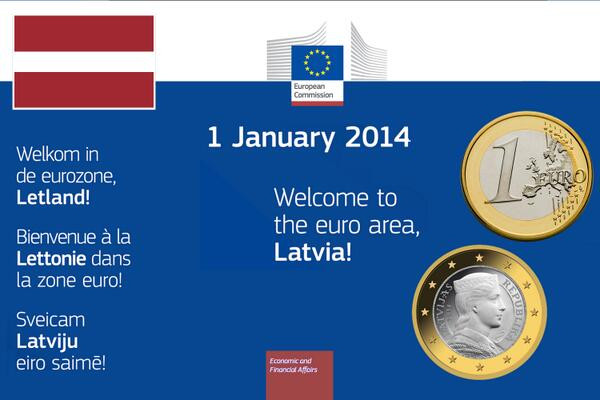Latvia and the journey to join the Eurozone
(Baonghean) - On the first day of 2014, Latvia officially became the 18th member of the Eurozone. This is considered a great opportunity for Latvia to develop its economy, however, there are also many challenges for this country.
 |
The Euro has been the official currency of Latvia since January 1, 2014. Speaking to thousands of people in the capital Riga, Latvia's acting Prime Minister Valdis Dombrovskis called this a great opportunity for the country's economic development and also an action to deepen integration with the West. Meanwhile, President of the European Commission Jose Manuel Barroso welcomed the newest member of the Eurozone, and appreciated Latvia's impressive efforts and "iron" determination to join the Eurozone.
In fact, since joining the European Union (EU) in 2004, with an economic growth rate of 10%, Latvia has cherished the ambition to become a member of the Eurozone soon after. However, this dream was quickly shattered after a period of overheated growth, the small republic of the former Soviet Union fell into crisis. Easy credit allocation and rapid wage increases were the main reasons for the Latvian economy to be overloaded. During the period 2008 - 2009, the country's gross domestic product decreased by 25%. At the end of 2008, the Riga government was forced to ask for help from the International Monetary Fund (IMF) and the European Union and had to accept an unprecedented austerity plan for the country. However, with its strong will, Latvia surprised its "patrons" by maintaining a fixed exchange rate between the national currency "Lats" and the Euro throughout the crisis. In 2010, Latvia's growth was only 0%, but in the following two consecutive years (2011 and 2012), Latvia jumped to the top among the 28 EU members, with a high growth rate of 5%. According to forecasts, this rate will be 4% in 2014. In addition, Latvia also paid its debt to the IMF and the EU two years ahead of schedule.
Latvia's "miraculous" efforts to overcome the crisis and its "unwavering" determination to join the Eurozone were rewarded in early June 2013, just three months after the country filed its application. The European Commission (EC) and the European Central Bank (ECB) recognized Latvia as meeting the Maastricht Treaty criteria, which are financial and macroeconomic requirements for a country applying to join the Eurozone. This event was not only a joy for Latvia, but for European leaders, it was also important evidence that the Eurozone is still attractive despite the crisis. At the same time, it is hoped that Latvia's accession to the Eurozone will bring financial stability to the country, stimulate investment and eliminate currency speculation. Dutch Finance Minister Jeroen Dijsselbloem said that Latvia's admission to the Eurozone was the result of the government's efforts to reform the country's economy and finance. European Union (EU) Economic Commissioner Olli Rehn stressed that Latvia becoming the 18th member of the Eurozone is the answer to those who still doubt the viability of the Eurozone.
However, many people within the small country remain skeptical about the need to join the Eurozone at a time when the EU is drowning in debt and the Latvian government is in crisis. Recent polls have shown that about half of Latvians oppose the currency change. They fear that joining the Eurozone will cause prices to skyrocket and are unhappy with the severe spending cuts that Latvia must make to meet the strict criteria for joining the Eurozone. Prime Minister Dombrovskis's government has also acknowledged that implementing a "responsible" spending program to avoid bankruptcy will be key to any future success, a statement that clearly implies continued implementation of drastic spending cuts. As for the Eurozone, the economic situation of the 17 countries that use the euro has not improved much. Despite the continued implementation of harsh austerity policies, recent figures show that the Eurozone is sinking deeper and deeper into crisis, while public debt is increasing. In addition, unemployment in Europe, especially among young people, is becoming more and more serious. According to statistics, the average unemployment rate in the Eurozone is currently 12.2%, while the unemployment rate among young people has exceeded 50% in some countries.
Despite admitting that it still faces many difficulties, Latvia's political leaders still believe that becoming a member of the Eurozone will bring benefits in the medium and long term for small countries like Latvia, especially when neighboring countries like Finland and Estonia have also joined the Eurozone since 2011. Latvia will learn from the experiences of these two countries to ensure a "smooth transition" from the national currency to the euro.
Ngan Giang






